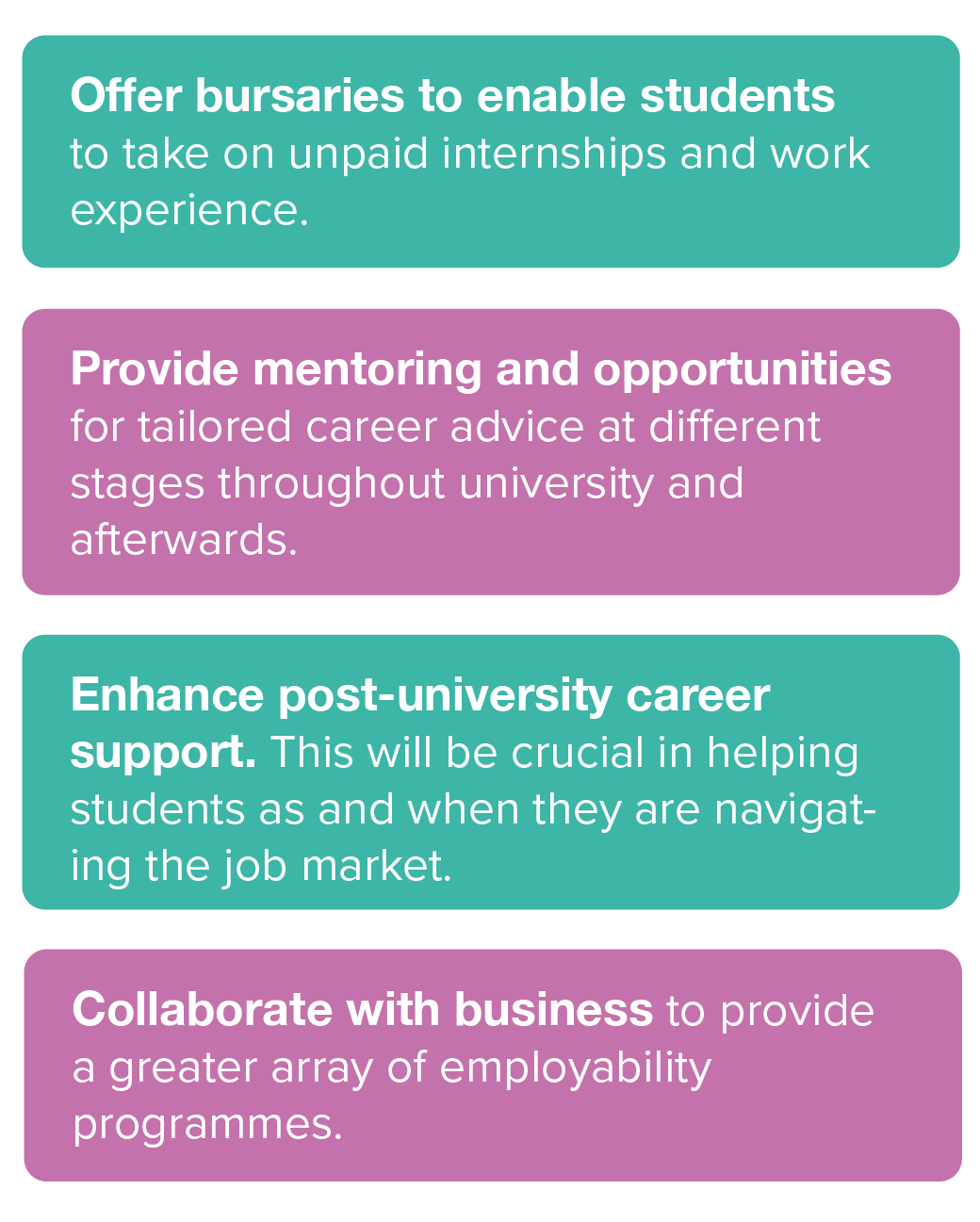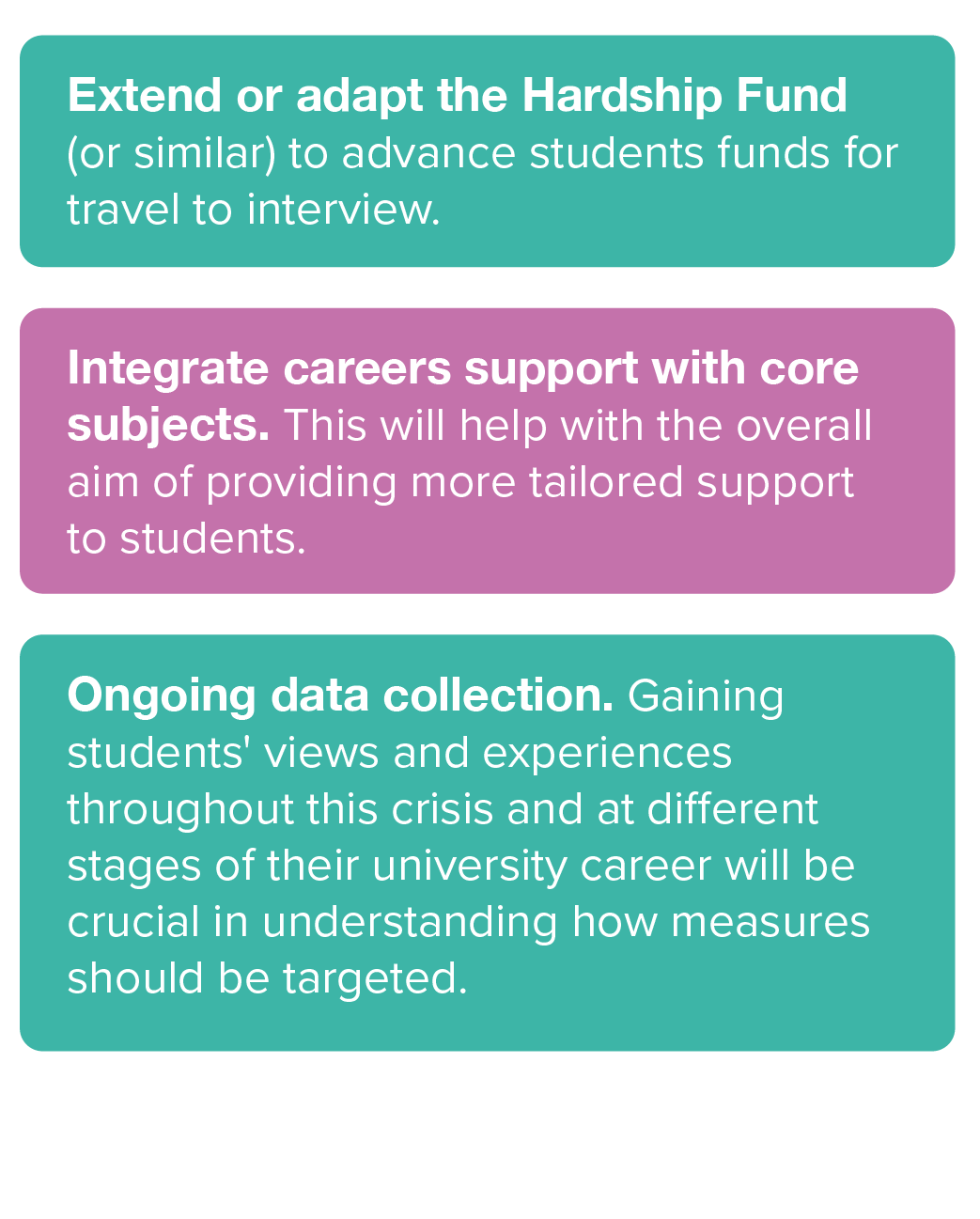The cost of living crisis and graduate outcomes
The cost of living crisis and graduate outcomes
New research highlights that over a third of university students are at risk of financial hardship this academic year. Not having enough money while studying is tough. It also has the potential to have wide-ranging impacts on graduate outcomes and employability. We share some practical recommendations for universities, to help them break the link between student hardship and lower graduate outcomes.
A new analysis of the Student Academic Experience Survey, Learning with the Lights off conducted by MillionPlus indicates that more than 300,000 students (17% of survey respondents) are at serious risk of financial hardship this academic year. The report indicates that age and belonging to a 'Black ethnic group' are the two strongest predictors of being at risk of financial hardship. Socio-economic background and commuter status are also key categories.
As is highlighted by Save the Student, financial pressures can impact on all areas of students’ lives including grades, relationships, health and social lives. The National Union of Students also draw attention to the potential that inequalities will be entrenched as trans/non-binary students, students from ethnic minority backgrounds, students with caring responsibilities, mature students, disabled students and students from lower socio-economic backgrounds are likely to face disproportionate effects.
Over the past year, increases in student maintenance funding across the UK, which have been in the region of 2%, have been far outstripped by rising prices. This brings into focus a long-standing shortfall in financial support for students. A recent survey suggested that students’ maintenance loans now come £439 short of covering their costs each month, up from the £340 shortfall in last year. Students also lack access to wider government assistance: much of the support available during the current crisis requires the receipt of benefits as a prerequisite. Support that is available to students, such as the council tax exemption, does not go far enough.
Financial hardship affects students’ experience while on course: the most recent National Student Money Survey by Save the Student found that of the 82% of students who had considered dropping out, 52% did so due to money worries. Research by the Bridge Group shows that students from lower socio-economic backgrounds already rely on part-time work to support their studies. At the same time, these students are less likely to engage with extra-curricular activities and studies-related work and internships.
Impact on employability and graduate outcomes
Financial hardship for students poses a risk to their graduate outcomes and employability. For instance, research by the Bridge Group has found that students from lower socio-economic backgrounds are more likely to express concerns about not being able to afford to relocate to find graduate opportunities. Short-term cost of living concerns can outweigh the potential benefits that relocating can offer in the long term relating to progression and pay. Furthermore, the costs associated with unpaid internships and work experience can be especially concerning to students from lower socio-economic backgrounds.
We have also found that students from higher socio-economic backgrounds have a number of advantages that can impact their career opportunities and preparedness. For example, students from higher socio-economic backgrounds can have more options post-university: the ability to travel, undertake postgraduate studies or unpaid work. While at university, these students can also draw upon networks of friends and family for career advice.
What are universities doing?
Universities have stepped up and introduced a wide range of measures including expanding hardship funds; working with retailers to reduce costs; and relaxing requirements for in-person attendance to help commuter students. They also have the capacity to analyse emerging trends to help target measures. Policy platforms like Wonkhe have also provided practical advice on how various actors on and off-campus can help students.
Universities should be commended for their swift actions and response to students’ concerns, but it must be recognised that universities may not be able to go far enough, especially over the medium to long term. Further, the impact on these institutions themselves must be considered carefully, especially the universities with a higher proportion of students from groups at-risk of financial hardship to support.
Policy proposals to alleviate student hardship
There are a number of policy options that could be enacted in the short term, and there is a growing consensus. Russell Group universities and MillionPlus have urged that maintenance funding should be reviewed and at the very least in the short term should be increased. It is suggested this may take the form of moving support – at least in part – to a grant rather than a loan, which would also help to alleviate students’ concerns around their finances over the long run. Other suggested measures include better inclusion of students into wider government support packages as well as mechanisms to ensure energy discounts are passed onto student tenants.
Breaking the link between student hardship and lower graduate outcomes: Bridge Group recommendations for universities
We have conducted a number of research projects on the topic of how socio-economic background relates to graduate outcomes and employability. These range from focusing on the science faculty of a Russell Group university, or on Black graduates at a post-92 university, to exploring graduate retention in the regions and the impact of outreach on graduates’ early career experiences and outcomes. Here we share some recommendations from those reports that are even more important in the current cost of living crisis. We encourage universities to consider them.
In addition, our report on graduate retention in the regions recommends that universities should continue to expand opportunities for placements, projects and other forms of work exposure with local employers, particularly with SMEs and social enterprises, or volunteering with community groups. Greater exposure to employment in the regions may alleviate some of the concerns students have around the cost of having to move away to find opportunities.
We know that financial concerns are key drivers of participation in higher education and can greatly affect how students get on at university and beyond. This crisis and how it is responded to will be critical in demonstrating a true commitment to equal opportunities.
James Adam, Research Officer at the Bridge Group
James Adam, Research Officer at the Bridge Group


